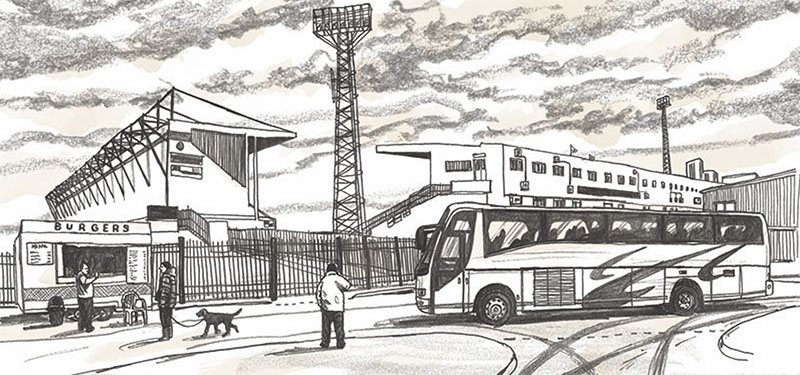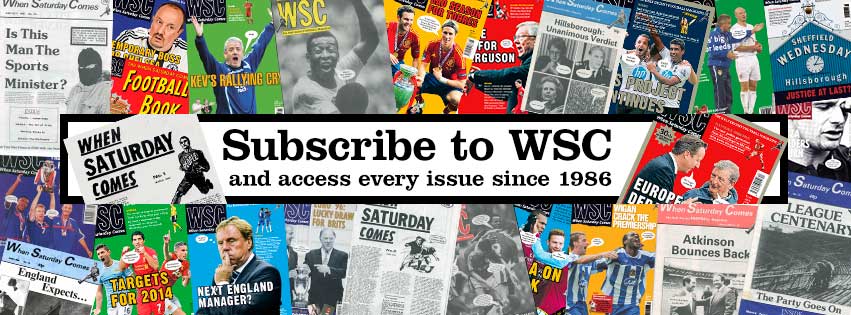
We are now accepting entries for the 2018 WSC writers’ competition. By way of inspiration, here is David Bailey’s runner-up entry from 2017, about life as a football coach driver
13 March ~ In this business they are the crème de la crème, sitting haughtily behind the wheel. Rarely, if ever, acknowledging the presence on the highway of a fellow coach driver. But there is no bitterness from us – only admiration. It takes years of sacrifice to reach the pinnacle: the early starts and late finishes, the irreversible damage to family life, the forelock tugging. Then one day, after decades of loyal service, they were rewarded by being made the coach driver of a professional football team.
Right across the leagues these elite wheelmen hold themselves apart. Wherever they turn up, be it Crewe or Ipswich, what they are saying is they are best driver in their home town. Even if the football team I am carrying is crap, I am number one, so kindly get out of my way.
Last year, on my first day as a coach driver in the provincial English town I’d just moved to, I was thrilled to see the local football team’s coach parked in the yard. But any hope that I’d be driving “the lads” (and possibly some I’d even heard of) was dashed with the kindly smile that I have since learned is reserved for overeager newbies.
But that did not mean that I wasn’t to be entrusted with driving the coach at other times. This local team are rooted firmly in the lower divisions and therefore cannot afford to own a coach. Instead they rent one for away matches. On weekdays and out of season the vehicle earns its keep ferrying schoolchildren and during the school holidays is used for day trips open to everyone but mostly undertaken by pensioners.
Unlike the local schoolkids some of the town’s elders do have an interest in their local team’s fortunes so are always impressed by the coach taking them on their day out. On first impression it is indeed an impressive-looking vehicle, in the way a limousine is impressive when you first see one. And yet like a limousine whose backseat will have experienced a thousand puking hen parties, on closer inspection the coach is more than slightly grimy; the microwave carries the remains of a thousand exploding pasties, the waft coming from the opened fridge is similar to something I once found in a lay-by and the satellite TV only works intermittently, always cutting out at the bit that catches your interest. Other eye-openers for the luckless punters include being mistaken not for football superstars but for underachievers. As we pass through the less salubrious parts of rival towns, the locals waving wanker signs and running their fingers across their throats does tend to blemish a day trip to a steam engine museum followed by cream teas.
The local team’s supporters’ club also use “my” coach company to travel to away matches and are by far my favourite passengers, and not just because they are surprisingly well behaved. With everyday punters I have a personal policy of speaking only when spoken to but with the football mob I jump straight in. Even the dips in conversation are filled with football talk on the radio. At first I suspected that they were martyrs to the cause of supporting their local team, but martyrdom was never this futile. If the Premier League team I support were in the eternal lower-division doldrums I’d still support them but I wouldn’t travel all the way down to, say, Torquay for a midweek game. This hardy bunch do, though, and with a cheerful devotion that is remarkable and, dare I say, the backbone of English football.
Some local non-League teams will also sometimes hire a coach for big occasions, such as cup ties against opponents who are divisions above, the intention being to show that they are not a pub league outfit but a serious club who always travel by coach. These ties are often the biggest matches of the players’ careers and even a coach driver can get caught up with the nervous anticipation and camaraderie of an underdog team preparing for an FA Cup tie – a reminder of just how important the competition is to many. Although the team and supporters travel together, the hierarchy remains firmly in place – the directors and manager sitting at the front, the players at the back and the supporters in the middle in those seats by the toilet.
Once a chairman took me to one side to ask what I thought of the team’s performance. As they had just been hammered about 5-0 this pretty much spoke for itself. Still, I had an inkling that he was after an extra excuse to sack the manager along the lines of “Even the coach driver says you’re shit”. I wasn’t playing that game though, the bus driving trade unionist in me loath to see any man lose his job. I had begun to defend my fellow worker when the chairman cut me short with a look that said “Why am I asking the bloody driver?” then marched off to engage a car park steward.
He was wrong, though. We know a lot. In fact I’ve long suspected that many a football journalist has coach drivers among their contacts. We are privy to all sorts of misbehaving, tantrums and team information – I’m told some managers even hold team talks on the coach to prevent the opposition eavesdropping.
Furthermore, we have the power to influence a match. Just last season the Middlesbrough coach had a prang on the way to Stamford Bridge – the trauma of which was surely the reason for Boro’s subsequent woeful display. The season before at West Ham’s penultimate game at Upton Park, kick-off was delayed because the Manchester United coach became stuck in traffic, the company having failed to take into consideration the huge crowd that was likely to descend. So aggrieved were a number of Hammers fans by the driver’s thoughtlessness that they put his rear window in to teach him a lesson. And what about the time José Mourinho was blocked in a car park by a coach whose driver had most likely mooched off for a bite to eat, giving José the inspiration for the tactic that has served him rather well – “Parking the bus”.
For the most part, we are a nonentity, a faceless stoop getting you from A to B. A saying among coach drivers is that the punters only ever realise you are there when you are not, or lost, or nodding off. I quite like the anonymity of it all; my idea of hell is being serenaded by a lusty, or even worse a half-hearted, “For he’s a jolly good driver”. I’m really not.
And yet despite the poor wages, long hours and having to clean the coach, in all it’s not that bad a job. There are tea breaks galore, we get in for free at heaps of places, including most football grounds, and if a punter is sick it doesn’t matter because we get an extra 25 quid to clean it up – but only if we provide video evidence. David Bailey
Illustration by David Sparshott
Click here to find out how to enter the 2018 WSC writers’ competition – there is a £250 cash prize for the winner, whose article will be published in WSC this summer

